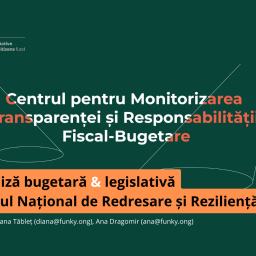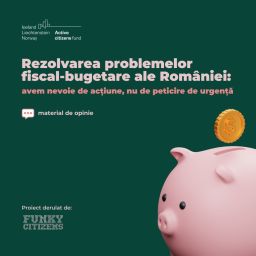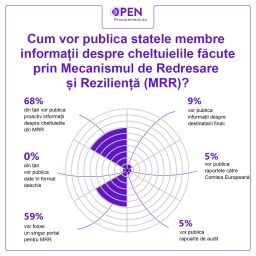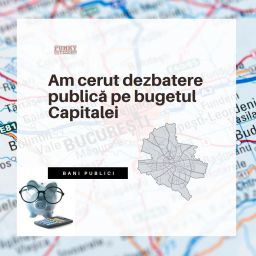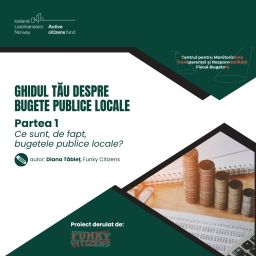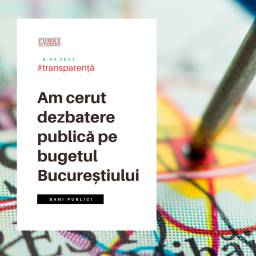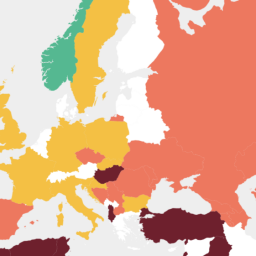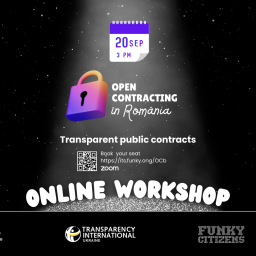On the 9th of December, the International Anti-Corruption Day, we invited members of local authorities to a webinar on transparency in public procurement from the perspective of open contracting. This set of principles, successfully implemented in Eastern and Western European countries alike, was explained in detail by Karolis Granickas of the Open Contracting Partnership, and participants were presented with a case study on the ProZorro procurement platform presented by Serhii Pavliuk. Transparency International Ukraine.
The webinar was preceded by a public conference on the same topic, attended by PSD, PNL and USR party MPs, as well as the French Ambassador to Romania and a representative of the French Anticorruption Agency. You can watch the conference below.
Open Contracting în RomâniaJoi, 9 decembrie, de Ziua Internațională a Anticorupției, vă propunem o discuție despre cum putem digitaliza, simplifica și transparentiza contractele publice. E cu atât mai necesar să purtăm discuția aceasta acum, când ne pregătim să absorbim fondurile din PNRR. ———— INVITAȚI ✔️ Laurence AUER — Ambasadoarea Franței în România ✔️ Pierre Yves ALLAIN — Expert în achiziții publice și contractare deschisă, AFA (https://www.agence-francaise-anticorruption.gouv.fr/fr) ✔️ Ana CĂTĂUȚĂ — Vicepreședinte, Camera Deputaților, Deputat PSD de Bacău ✔️ Diana BUZOIANU — Deputat USR de București ✔️ Sebastian BURDUJA — Deputat PNL de București MODERATOR: Elena CALISTRU — Președintele asociației Funky Citizens Detalii despre proiect pe https://its.funky.ong/open-contracting Evenimentul va fi urmat de un webinar aplicat, dedicat exclusiv autorităților locale, eveniment accesibil doar pe bază de invitație. —————————————————— Proiect implementat cu sprijinul Ambasadei Franței în România / Institutului francez din România Eveniment realizat cu sprijinul Open Contracting Partnership —————————————————— Le jeudi 9 décembre, à l’occasion de la Journée internationale de lutte contre la corruption, nous vous proposons une discussion sur la façon de numériser, simplifier et rendre les contrats publics plus transparents. Il est d’autant plus nécessaire d’avoir cette discussion maintenant, alors que nous nous préparons à absorber des fonds du Plan national de relance et de résilience. L’événement sera retransmis en ligne, nous vous invitons donc à „y aller” / „y participer” pour vous rappeler quand la transmission commencera. INVITÉS: ✔️ Son Excellence Madame Laurence AUER — l’Ambassadrice de France en Roumanie ✔️ Pierre Yves ALLAIN — Expert in achats public et contrats ouverts, AFA (Agence Française Anticorruption – https://www.agence-francaise-anticorruption.gouv.fr/fr) ✔️ Ana CĂTĂUȚĂ – Vice-Président de la Chambre des Députés ✔️ Diana BUZOIANU — Depute de groupe USR ✔️ Sebastian BURDUJA — Depute de groupe PNL MODÉRATEUR : Elena CALISTRU — Président, Funky Citizens Détails du projet sur https://its.funky.ong/open-contracting. L’événement sera suivi d’un webinaire dédié exclusivement aux autorités locales, accessible uniquement sur invitation. Après le webinaire, nous interviewons certains des participants pour obtenir leurs messages. Projet réalisé avec le soutien de l’Ambassade de France en Roumanie / Institut français en Roumanie. Événement organisé avec le soutien du Open Contracting Partnership.
Posted by Funky Citizens on Thursday, 9 December 2021
Below, we invite you to read our report, prepared following this webinar, detailing:
- How transparency is seen at the local level
- What the implementation of open contracting can bring to the table
The need for transparency from the earliest stages of the procurement procedure and attempts at transparency
Although the legislation does not provide for the obligation or possibility of publishing and debating the specifications in the case of a public procurement, some municipalities have tried this exercise to make the procedure even more transparent and to attract more bidders, while involving as many participants as possible.
In addition to the rigidity of the procedure and the technical aspects that often contribute to the difficulty of the process, the reluctance to transparency sometimes occurs even from within the administrative apparatus, which leads us to think that, often, transparency is also about the culture of the place.
In addition to the website of the institutions in question, the Facebook pages of the mayors are, more recently, a channel for the transparency of the public procurement process.
Despite these one-off transparency initiatives, what seems to be missing is a strategy that looks at how these platforms and channels can be used to make procedures more transparent. In the absence of strategies that bring all approaches together, transparency in public procurement seems to be an approach that is more in line with the subjective ambitions of heads of institutions, but not necessarily an attitude that reflects the entire administration in which it operates.
Is transparency a universal remedy?
Transparency, seen in isolation, remains, in the absence of concrete measures through which it can be implemented, a beautiful value towards which public authorities and institutions tend. The lack of independent force has been acknowledged by some local governments, which is why we are pleased to see the systemic approaches taken by some governments. For example, in addition to the rigors of the law that must be observed to ensure the transparency of the administration, some authorities are beginning to take an increasingly proactive approach to this issue, especially when it comes to public procurement. Some unwritten practices in the field would be the publication of contracts on the site, the debate of investment projects or the promotion in the online environment of the projects launched by the town halls.
We have also been pleased to note that transparency is not only seen as the external image displayed by a local authority, but on the contrary, the authorities have an increasing interest in addressing the issue from the staff. within the authority.
For example, some authorities are taking steps to increase transparency and ethics in local government as well as training for city hall employees. Because the changes are not visible if there is no indicator of comparison, these measures are sometimes supplemented by studies on the perception of corruption within the mayor's office.
Last but not least, the transparency of local money is also a good exercise to get closer to the citizen, an exercise materialized by implementing participatory budgeting.
Transparency vs bureaucracy
One of the needs most often raised in discussions, both at central and local level, was to maintain a balance between the transparency of public procurement and the need to simplify, debureaucratize and speed up procedures.
With a procedure that can already get stuck in some places, exceeding reasonable deadlines for contracting a contract and, most importantly, maybe even the deadline for implementing a work itself, a big dilemma remains: how to keep a balance between increasing the transparency of public contracts and, at the same time, the local need to implement projects in a timely manner.
However, these needs should not be seen as opposites, but rather as two parts which, once implemented in a balanced way, contribute to the efficiency of the administration.
The allure of public funds
Whether we are talking about the commune or the county, according to some of the mayors, public money often seems to fail to be the most competitive resource for the private sector.
This trend is observed not only when it comes to competition between local bidders but also as problematic when it comes to attracting professionals to work in specialized public procurement departments at the local level.
How can open contracting solve these problems
In addition to the rigors of Romanian legislation when it comes to transparency of public contracts, principles and standards of open contracting bring the novelty of a series of measures that can be implemented by each authority. For transparency to become part of the culture of the place they should be seen as part of a complex strategy, not as one-off approaches.
Therefore, for each of the needs expressed by the contracting authorities at the local level, there are also subsequent solutions adapted to this level.
- Increasing trust in public authorities by:
- increasing their efficiency
- Introduction of mechanisms to ensure the traceability of transactions made for the implementation of the contract;
- Digitizing the process makes the preparation and monitoring of the acquisition take less time;
- Fewer appeals that complicate the procedure and delay the implementation of the contract;
- thorough monitoring of contract implementation
- Local councils may introduce provisions to take into account regular visits by local decision-makers to places where certain works or service contracts are being implemented;
- creating communication channels for citizens and the private sector
- A good way to include citizens in monitoring a purchase is to create communication channels for them to send feedback both when contracting and when implementing a contract;
- Local authorities could also introduce a mechanism to consult authorities with the private sector and civil society, in order to receive feedback on the procedure and to identify problems in the system;
- strategies to support small local bidders
- Local authorities can set targets for the number of contracts awarded to small and medium-sized enterprises. This requires continuous communication on the strategy to create a more inclusive purchasing process;
- Creating strategic plans that lead to better transparency in local government
- Small but safe steps to increase transparency
- The contract concluded would be public and accessible, either in its entirety or just the key information it contains. At this time, the public procurement contract is not published, but can only be accessed in the case of a request to the relevant authority under the law 544.
- Data will be published uniformly so that it is possible to track the spending of funds (eg. tracking of payments and deliveries) on the whole line of public contracts. This would be possible through the publishing of invoices, in an electronic format, open and free. The OCDS would ensure the publication of standardized data for each event or change that occurs in the contracting process, so that changes can be tracked over time.
- It will be possible to track all transactions which were made in order to implement the contract (payments, deliverables and their status), together with the stages of the transactions, audit reports, evaluation reports, contractual amendments, minutes / notes concluded.
- Documents on the long-term impact assessment and sustainability of the contract will be published.
- Procurement related to, for example, a pandemic will be much easier to track by collecting and labeling all contracts and budget lines related to COVID-19.
- Geo-coded data can also be published so that services to underserved communities can be tracked.
Sources used:
Project implemented with the help of the French Embassy in Romania / The French Institute in Romania
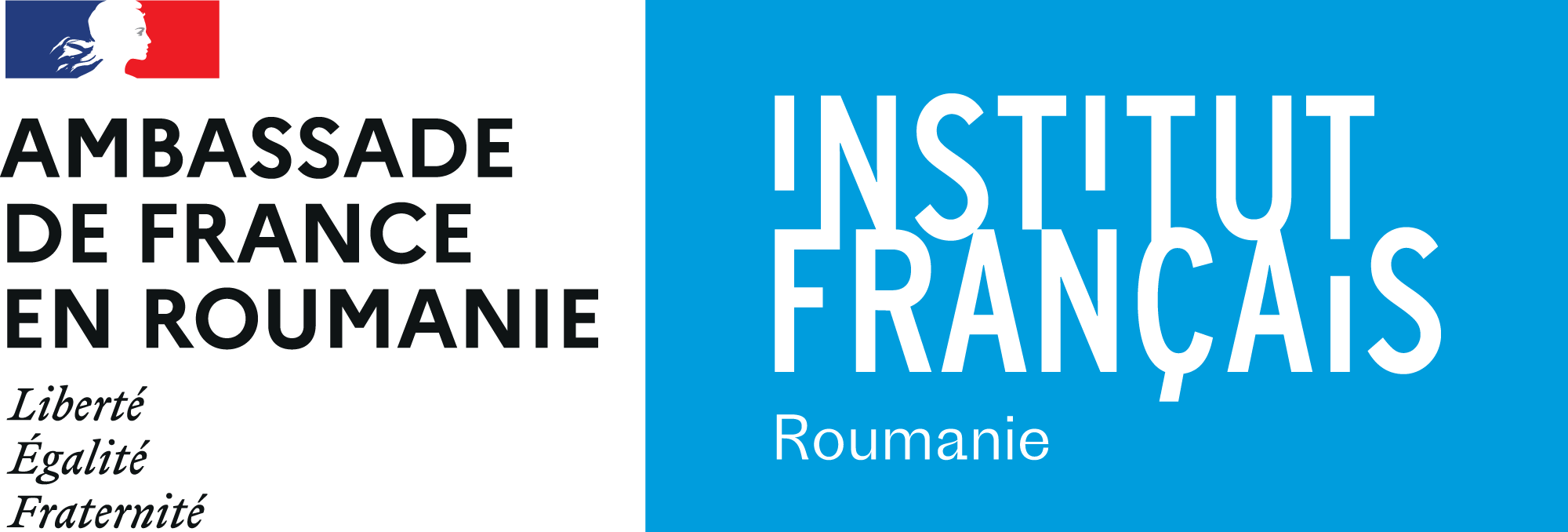
Eveniment finanțat cu sprijinul Uniunii Europene






